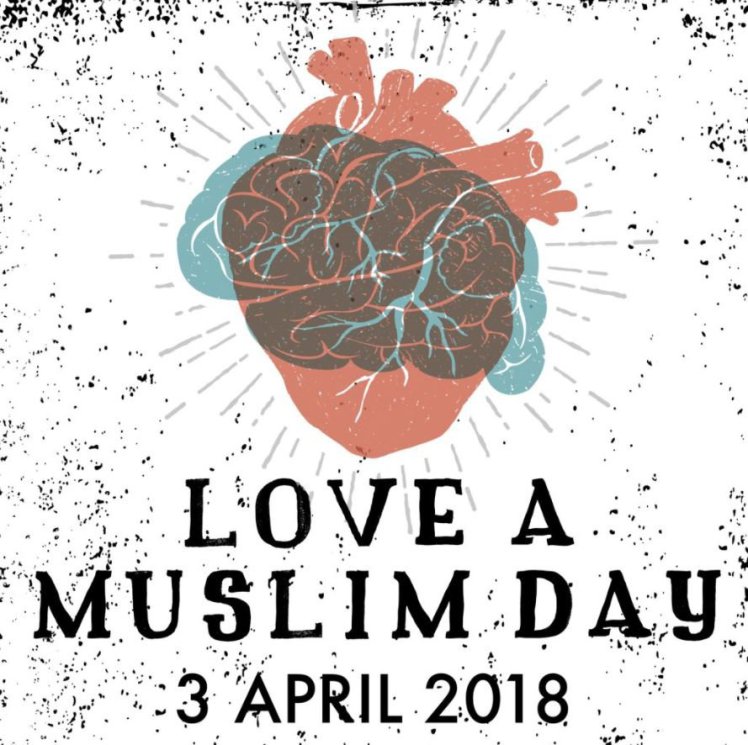A poster calling for ‘Love a Muslim Day’ on April 3rd has gone viral after a letter campaign containing anti-Islamic statements called for ‘Punish a Muslim Day’ on the same day. The new poster directly contrasts the Islamophobic campaign, calling on people to do nice things for Muslims and people in need.
In contrast to the ‘Punish a Muslim Day’ letters, which contained a point system to reward violence against Muslims, the poster has a points system to reward actions such as smiling at a Muslim and fasting during Ramadan and celebrating Eid. Several events in UK cities are being held to mark the day including in Newcastle, Nottingham, and Leeds.
The poster was created by Mend’s (Muslim Engagement and Development) Yorkshire Regional Manager, Shahab Adris, who said, “It’s crucial to rid our society from anti-Muslim popular attitudes and the best way we can do this is by engaging and enjoying each other’s company … There is so much we can learn from each other and together we can make our communities a more welcoming and tension-free environment”.
The ‘Punish a Muslim Day’ campaign has caused significant concerns about safety among the British Muslim population. Worries have also been expressed that non-Muslims could potentially be targeted by the campaign if they are perceived as Muslims. A Muslim advocacy group in the USA revealed they had also received enquiries from U.S. Muslims concerned something similar could happen to them.
While the ‘Love a Muslim Day’ campaign did go viral, receiving a lot of support, Salma El-Wardany writes in the Huffington Post that it is just another manifestation of an endless cycle of Muslims being mistreated and nothing actually being done to solve the underlying problem, a cycle to which both Muslims and non-Muslims contribute.
She writes, “Every few months the same cycle repeats itself. Someone says something hateful towards Muslims, like banning them from an entire country, or something happens to threaten either large groups of white civilians, or Muslims. When either of these groups are threatened, the response that is triggered is exactly the same. Muslim communities, and left-wing liberals who get their kicks from helping the underdog, begin to apologise and validate the place of Muslims in the Western world. The internet is then flooded with viral videos and tweets that everyone believed are helpful and necessary, while also being motivational and uplifting … I think as a Muslim I’m supposed to feel warm and fuzzy on the inside, but it only leaves me rolling my eyes in irritation as we, once more, start the dreary ‘we’re so normal/please accept us’ tirade”.
She adds, “The truth of the matter is we don’t need your love, your hollow tweets or your random hugs in the street to make us feel part of this land. Similarly, we don’t need the constant drivel of apology from Muslims across the land and the overflowing gratitude they bestow on any non-Muslim who happens to stand up for them. Enough already. When are we going to stop the incessant conversation and normalising Islam that serves no further purpose than to constantly show the world we are still not accepted here? That this place is not ours to call home”.
The ‘Love a Muslim Day’ campaign perpetuates this cycle. What is needed instead, according to el-Wardany, is the allowance of Muslims to tell and live their stories, “To include Muslims into the fabric of our culture and existence not because they’re Muslims, but because they’re just normal people”. Currently, el-Wardany argues, narratives of Muslim lives do not exist outside of those about terrorism, honour killings, and apologies. Alternative narratives have become impossible to create because Muslims have to expend their efforts on validating their rights to have these narratives in the first place.
She concludes, “We must live in our true, authentic lives and for most Muslims, that doesn’t revolve around how ‘Muslim’ they ae. We just happen to be Muslim while doing all the things everyone else does. We are more than just Muslim and those are the stories we need to tell”.
Sources
Ballinger, L. (2018) ‘Love a Muslim Day poster goes viral in response to vile racist mailout’. [online] 12 March. https://www.examiner.co.uk/news/west-yorkshire-news/love-muslim-day-poster-goes-14400081. [Accessed 30 March 2018].
Kuruvilla, C. (2018) ‘’Love a Muslim’ Day Letter Is A Poignant Answer To Hate Threats’. [online] 15 March. https://www.huffingtonpost.co.uk/entry/love-a-muslim-day-letter-is-poignant-response-to-violent-islamophobic-campaign_us_5aa97bf7e4b0600b82ffa17c. [Accessed 20 March 2018].






